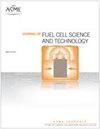Safety Analysis of a Solid Oxide Fuel Cell/Gas Turbine Hybrid System Fueled With Gasified Biomass
引用次数: 16
Abstract
The effect of biomass gas on the safety performance of a solid oxide fuel cell (SOFC)/micro gas turbine (GT) hybrid system was studied with consideration of the fuel cell working temperature, fuel cell temperature gradient requirement, compressor surge zone, and turbine inlet temperature (TIT). The safety performance of the hybrid system on the design condition and off-design condition was also analyzed. Results show that the hybrid system is good adaptability to low concentrations of biomass gas. The electrical efficiency could reach 50% with different biomass gases and is higher than the other combined power systems that used biomass gas. The wood chip gas (WCG) would make the fuel cell or GT easier overheat than the other three gases. The cotton wood gas (CWG) and corn stalk gas (CSG) are easy to cause the TIT too low or the compressor surge. In the safety zone, considering the hybrid system load adjustment range, the effecting order (from large to small, following is same) is WCG, grape seed gas (GSG), CSG, and CWG. Considering the hybrid system electric efficiency, the effecting order is WCG, GSG, CWG, and CSG.以气化生物质为燃料的固体氧化物燃料电池/燃气轮机混合系统的安全性分析
考虑燃料电池工作温度、燃料电池温度梯度要求、压气机喘振区和涡轮进口温度等因素,研究了生物质气体对固体氧化物燃料电池(SOFC)/微型燃气轮机(GT)混合动力系统安全性能的影响。分析了混合动力系统在设计工况和非设计工况下的安全性能。结果表明,该混合系统对低浓度生物质气具有良好的适应性。不同生物质气体的电效率可达50%,高于其他使用生物质气体的联电系统。木屑气体(WCG)将使燃料电池或GT比其他三种气体更容易过热。棉木气(CWG)和玉米秸秆气(CSG)容易造成TIT过低或压缩机喘振。在安全区内,考虑到混合系统负荷调节范围,影响顺序由大到小依次为WCG、葡萄籽气(GSG)、CSG、CWG。考虑混合动力系统的电效率,影响顺序为WCG、GSG、CWG、CSG。
本文章由计算机程序翻译,如有差异,请以英文原文为准。
求助全文
约1分钟内获得全文
求助全文
来源期刊
自引率
0.00%
发文量
0
审稿时长
6-12 weeks
期刊介绍:
The Journal of Fuel Cell Science and Technology publishes peer-reviewed archival scholarly articles, Research Papers, Technical Briefs, and feature articles on all aspects of the science, engineering, and manufacturing of fuel cells of all types. Specific areas of importance include, but are not limited to: development of constituent materials, joining, bonding, connecting, interface/interphase regions, and seals, cell design, processing and manufacturing, multi-scale modeling, combined and coupled behavior, aging, durability and damage tolerance, reliability, availability, stack design, processing and manufacturing, system design and manufacturing, power electronics, optimization and control, fuel cell applications, and fuels and infrastructure.

 求助内容:
求助内容: 应助结果提醒方式:
应助结果提醒方式:


